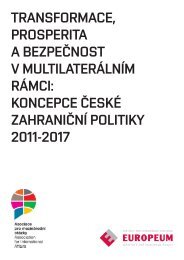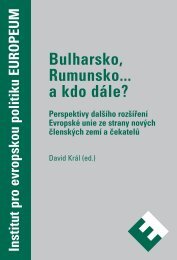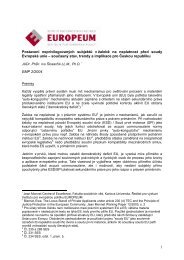eu constitutionalisation - EUROPEUM Institute for European Policy
eu constitutionalisation - EUROPEUM Institute for European Policy
eu constitutionalisation - EUROPEUM Institute for European Policy
Create successful ePaper yourself
Turn your PDF publications into a flip-book with our unique Google optimized e-Paper software.
Chapter 7: Flexible Integration in the Common Foreign and Security <strong>Policy</strong>lished in all policy areas, except of the field of exclusive competences.²¹ Inthe realm of CFSP, the limitation to solely implementing joint actions orcommon positions has been abolished, together with the explicit exclusionof matters having military or defence implications. In other words,the general rules governing enhanced cooperation unconditionally applyto the CFSP as well. Slight procedural differences persist when it comes toinitiating the procedure or with regard to the admission of member stateswishing to join the mechanism at a later stage.²²When looking more closely on the correlation between the trans-pillarregime of enhanced cooperation anchored in Article I-44 TCE and thespecific mechanisms of flexibility in the field of ESDP one has to differentiatebetween both concepts. The only legal basis effectively referring toenhanced cooperation is to be found in Article III-213 paragraph 5 of theoriginal draft dealing with “structured cooperation”, thus establishing, thereagain, a hierarchical order based on cross-references. However, this provisionhas been dropped in the later version.²³ Similarly, the other mechanismsof flexibility, such as that of closer cooperation, the execution of civilor military operations by groups of member states or active participationwithin the <strong>European</strong> defence agency do not relate to enhanced cooperationat all. They fall within the legal ambit of the general norms of CFSP andparticularly ESDP, laid down in Articles I-40 and I-41 TCE. However theopportunities offered by these mechanisms do not preclude the applicationof enhanced cooperation as such in the realm of <strong>for</strong>eign and security policy.Nonetheless it is apparent that, due to the specific mechanisms potentialissues <strong>for</strong> enhanced cooperation in the field of CFSP are limited in number.Respective initiatives may be considered with regard to civil measures oraspects of human rights protection.21) Exclusive competences are competition policy, monetary policy, common commercial policy, customsunion and the conservation of marine biological resources under the common fisheries policy; ArticleI-12 para 1 TCE.22) See Article III-325 para 1 and 2 TCE.23) See CIG 60/03 ADD 1, Annex 22, according to which the structured cooperation shall be established asa permanent mechanism, whereby the reference to enhanced cooperation has been dropped.248Chapter 7: Flexible Integration in the Common Foreign and Security <strong>Policy</strong>IV. NORMATIVE AND INSTITUTIONALCONDITIONS FOR ENHANCED COOPERATIONA. Conditions <strong>for</strong> establishing enhanced cooperation in the CFSPBasic conditions in the CFSPContrary to the detailed catalogue of general criteria contained in Articles43-45 TEU, specific conditions <strong>for</strong> enhanced cooperation in the field of CFSPare practically almost lacking. In order to close this gap, a complex systemof cross-references has been introduced into the Treaty. According to Article27a TEU the most important article in this respect, a number of fundamentalobjectives with regard to external relations must be observed, namely thesafeguard of the <strong>European</strong> values and the commitment to assert the Union’sidentity as a coherent <strong>for</strong>ce on the international scene. By reference inparagraph 2 to the general objectives of CFSP contained in Articles 11 et seq.TEU, the obligation to support and maintain a unified <strong>European</strong> profile ininternational affairs, gains additional substance. In turn, the Council’s competenceto assess whether the above mentioned obligations are successfullymet, confers significant discretionary powers to this body. With regard tointernal policies, enhanced cooperation in the CFSP has to preserve the commonacquis and to respect the principle of consistency within the second pillarand within the sphere of Union policies as a whole. To this end the CFSP hasto be understood in its entirety as shaped by the (<strong>European</strong>) Council, thusequally encompassing respective guidelines, strategic principles or specificdecisions. In other words, action in the framework of enhanced cooperationdoes not only have to consider respective treaty obligations but also has torespect results originating from political developments as <strong>for</strong> example laiddown in the regular Presidency conclusions. However, one has to observethat the specific conditions governing enhanced cooperation in the CFSPbasically aims at limiting its application and is obviously designed to complicatethe whole mechanism.General conditions as laid down in Articles 43-45 TEUA further reference contained in Article 27a TEU refers to Article 27c and theprovisions laid down in Articles 43-45 TEU. In other words, given the clear lackof a specific catalogue of conditions governing the establishment of enhancedcooperation in the CFSP (except of those mentioned above) one has to249








